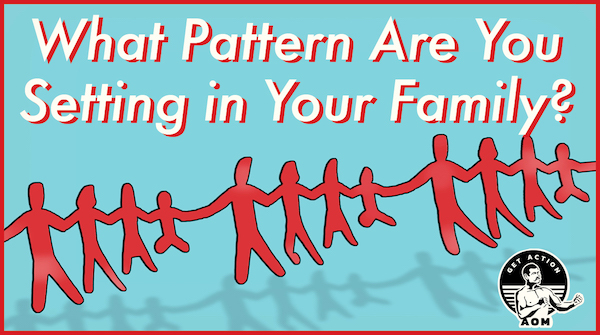When you’re making choices as a parent concerning your children and your family, it’s easy to choose whatever is most comfortable and convenient in the moment. But a friend of mine once gave me a much better criterion for making these decisions — asking yourself: “What pattern do I want to set for my family?â€
Let me give you a couple of examples of how we’ve used this advice.
Have you ever been camping with small children? It’s a hassle and a half. There’s the packing and unpacking. The fact that little kids can’t do all that much that makes this form of recreation enjoyable (can’t hike very far, swim, bait their own fishing hook, etc.). And the fact that they roll around in the tent and make what is already an unpleasant night’s sleep more unpleasant. The trip is a blast for them, but for Mom and Dad? It’s more work than fun. But, we’ve nevertheless tried to go camping at least once a year, even when the kids were young, just to set this pattern from the start: “The McKays spend time in the outdoors.â€
Example #2: One of our two cars is a dented 2007 rattlebox of a Honda Element with over 120k miles on it. I wasn’t crazy about the car when we bought it a decade ago when I was in law school, and I still have no love for it now. I’d really like to replace it with a nice truck. But, I feel like keeping the Element serves as an important symbol in our family; it sets the pattern: “We don’t replace something just for the heck of it; we use it up until it no longer functions.â€
The patterns you set will of course depend on the values you want to uphold in your own family.
I know folks who took their babies and toddlers on international trips — even though toting along this extra “baggage†naturally created difficulties and made things less fun for Mom and Dad — because right from the start they wanted to set the pattern: “We’re a family that travels.†I know parents who take their kids to church even on vacation, no matter how exotic and luxurious the location, to set the pattern: “Sundays are for worship.†I know those where the whole family, even the young children, have to go for a run before opening Christmas presents, to set the pattern: “Stuff is nice, but the greatest gift is physical health.â€
Asking yourself what pattern you want to set for your family is useful in helping you focus on the long term over the short. A decision can be convenient, and even seemingly make the most sense in the moment, but not contribute to the overall trajectory you’d like to set your family on.
The first time your toddler has a meltdown at a restaurant, handing him your phone can seem like a no-brainer, and an inconsequential decision. But you might check yourself by asking, “What pattern do I want to set here?â€: “We use our phones to soothe bad feelings and boredom,†or “We never use phones at the dinner tableâ€?
When your kids are “helping†with chores or “helping†you cook, and doing the tasks slowly and wrongly, and even making more work for you than if you just did the job yourself, it’s easy to feel like stepping in and taking things over. But stop and think not just about the result you want right now, but the result you want a year, five years, ten years down the line. Is it more important to get the chore done quickly, or teach your kid how to be responsible and competent?
My aforementioned friend and her husband decided very early on that instead of letting their four kids watch television on Saturday mornings, they had to read books instead. While the rule was hard to enforce when the kids were young, they say, now when Mom and Dad wake up, they’re delighted to see all their children sitting and reading on the couch (and they allow themselves to wake up later, as they feel better about sleeping in knowing their kids aren’t zombied out in front of a screen!).
Asking yourself what pattern you’re setting with a certain decision can be useful for individual choices, but is particularly powerful for familial ones, because within the walls of your home, you’re creating a tiny, but bona fide culture. A culture with its own norms and traditions. A culture that, as an invisible yet potent force, will influence parental happiness, and your children’s lives, far more than the things you try to more proactively teach or “lecture†about. It changes the calculus you use when trying to figure out whether some decision is worth it or not. What may seem like a small, insignificant choice when viewed as an isolated decision, may seem more important and worthwhile — and more motivating to follow through on — when viewed as a stepping stone for things to come, a piece of the scaffolding of your family’s culture, a building block for a pattern-in-progress.



